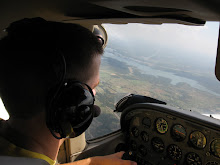"Seminole 256AT, radar contact, climb and maintain 7,000, clear direct Crimson VOR."
It's just a shade past 9PM and my student and I are headed back to home base after a day chock full of flying. As cross country flights go, they really don't come any more pleasant than this: my student is, despite his minimal experience, competent at the controls and thorough in his checklist usage, allowing me a few moments of reflection as we enter our cruise altitude. The air is smooth as glass and the sky is devoid of other aircraft here in central Alabama. Our route is free of turbulence and clouds, making these absolute ideal conditions for some night flying. You can see the stars for miles and for that reason, the world seems smaller on this night. Aside from the occasional airliner Captain reporting in with a new altitude, our only combatant against the peaceful dark silence is the constant hum of the propellers. If we can keep our speed up and receive a clearance vector from Atlanta approach control, there's still a chance I can make it to my bed by midnight.
Two months in to full time instructing, moments as these are rare. The days are packed tighter than a blackberry crepe, often times with more obligations than hours needed to fulfill. A couple of scheduled flights, a few hours of ground school, maybe toss in a simulator session or two, and before I can say je suis fatigue it's time to prepare for the next day. Nevermind eating; usually I'm about two meals behind. The days blend together so much that I'm constantly asking my non-pilot friends to confirm what day it is. "Wait, it's Friday? I thought it was Tuesday." No kidding. Happens twice a week.
I'm not complaining. It's an observation, and I'm ok with the schedule. Actually, I never thought it was possible that one could truly love a job. I absolutely love to fly airplanes and feel fortunate to have the job I want in the location I want. I love what I do. And unlike dominating my former 4th grade arch rival students in dodgeball, it's tough.
Each day brings forth new challenges. Right now, I'm struggling to convey the intricate aviation knowledge that I only recently acquired into my students' craniums during a ground school session. If not in the classroom, then I'm in the air, where I deliberately fail engines at dangerously low altitudes, all part of FAA-approved and company mandated pilot training. No pun intended, but flight instructing really is a crash course in becoming a pilot. I'm safe enough to survive my students' mistakes and fly across the country, but am I a good pilot? It's the question that no one can answer now that I'm done with checkrides. If we follow the federal aviation regulations and make it safely from A to B, does that count? What about if my students' keep passing their checkrides? Any credit for that? The short answer is that I don't know. In other endeavors, success is easily identifiable. In flight training, it's a bit more ambiguous, and short of me preventing a student from slamming our aircraft into terrain, I'm not sure what parameters I could use. These are the things I think about.
I also think about the road ahead, and how with every hour of flying time I'm able to log, the goal is that much closer to reality. To be sure, it's still a long, long ways off: the benchmark of aviation experience is determined through flight hours. While I've achieved the necessary ratings to fly for a living and even instruct others, I'm still a rookie in the greybeard pilot's eye, and rightfully so. No airline worth a bag of salted pretzels would even consider touching a pilot with under 500 hours, with many airlines' hiring minimums well in excess of 1,000 hours. For me, I've set my sights on 1,500 hours, the minimum criteria to apply for what's known as the doctorate of aviation: Airline Transport Pilot. It's the highest rating a pilot can earn, and short of getting hired by a small freight company prior to that mark, I plan on flight instructing as a means to reach that end. A quick glance at the logbook shows I have light years to go, but with every botched student pilot landing I survive, I'm that much closer to attaining it. Ever save up spare change in hopes of one day taking a vacation? For every nickel and quarter you put in, it might add up to something great. Same concept here, only the road to 1,500 seems like a slow crawl some days. Maybe I need to quit making logbook entries after every flight. Maybe I need to snake more flights from the tired and experienced instructors. Or maybe I need to stop daydreaming and just enjoy the journey a bit more.
Perhaps that's why I enjoy night flight so much. The tranquility that the darkness offers allows me to relax and breathe easy, knowing that my student is straight-and-level at cruise altitude with minimal workload. The goals I have and the dreams I'm chasing-they'll come in time. For now, the drive to get there is a grueling one, yet it's the exact place I'd choose to be 100 times over. So tomorrow, as I embark on yet another long trip well after sunset, this time to Daytona Beach, forgive me if I take another moment or two to sit back, enjoy the air, and reflect. With one eye on my student, of course.
Wednesday, March 31, 2010
Subscribe to:
Post Comments (Atom)


Seriously, Gabe, you have a gift for writing. And flying, apparently. :)
ReplyDelete